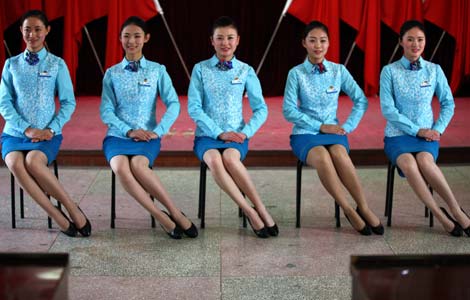

II. PROSPERITY
China and the EU enjoy one of the world's biggest and most dynamic trading relationships. Their trade and investment exchanges have become a major engine driving their respective economic development and innovation. Both sides share responsibility for ensuring that their economies remain key drivers for global economic growth and providing prosperity for all. They are committed to building a world economy where all countries enjoy development and innovation, interconnected growth, interests converging, and firmly safeguarding and developing an open world economy. In that perspective, they are determined to enhance further their trade and investment relationship towards 2020 in a spirit of mutual benefit, by promoting open, transparent markets and a level-playing field. Particular importance will be paid to improving opportunities for Small and Medium Sized Enterprises (SMEs).
Key initiatives:
(I) Trade and investment
1. Reaffirm the importance of the annual High-Level Economic and Trade Dialogue as an essential forum for planning and guiding the development of China-EU economic and trade relations as well as taking strategic decisions on important trade, investment and economic issues.
2. Negotiate and conclude a comprehensive China-EU Investment Agreement that covers issues of interest to either side, including investment protection and market access. The China-EU Investment Agreement will provide for progressive liberalization of investment and the elimination of restrictions for investors to each other's market. It will provide a simpler and more secure legal framework to investors of both sides by securing predictable long-term access to EU and Chinese markets respectively and providing for strong protection to investors and their investments. It should replace the existing bilateral investment treaties between China and EU Member States with one single comprehensive agreement covering all EU Member States.
3. Negotiating and concluding such a comprehensive China-EU Investment Agreement will convey both sides' joint commitment towards stronger cooperation as well as their willingness to envisage broader ambitions including, once the conditions are right, towards a deep and comprehensive FTA, as a longer term perspective.
4. Strive to create the conditions for continued high and sound growth in China-EU trade.
5. Increase exchanges on public procurement policies in order to accelerate and complete the process leading to China's accession to the WTO Government Procurement Agreement.
6. Step-up coordination at the multilateral level, notably on global governance issues dealt with by the G20 and WTO, pushing forward the Doha round of negotiations. China and the EU will strive to get WTO members to reach agreement on trade facilitation and some agriculture and development-related subjects at the 9th WTO Ministerial Conference and, on this basis, lay out a roadmap for further negotiation. In this context, they will strive to reach an agreement on the review of the ITA. Both parties are dedicated to the full conclusion of the Doha round of negotiations.
7. Make full use of the existing bilateral mechanisms to strengthen communication, handle major bilateral trade frictions through dialogue and consultation as a preferred option, and, if needed, through negotiations, with an objective of finding mutually beneficial solutions.
8. Both sides recognize that it is critical to follow WTO rules when undertaking trade remedy investigations or imposing trade remedy measures, to prevent their abuse. Commit to administer anti-dumping and countervailing duty investigations in a fair, objective and transparent manner.
9. Promote practical win-win cooperation between China and the European Investment Bank.
10. The EU takes note of China's intention to explore options for closer cooperation with the EBRD, in order to support investment in European countries.
11. Confirm the leadership and coordination role of the China-EU Joint Customs Cooperation Committee (JCCC) in strengthening China-EU Customs cooperation; sign a new Strategic Framework for China-EU Customs Cooperation for 2014-2017, with special focus on border enforcement of IPR, supply chain security, anti-fraud and trade facilitation and external trade statistics.
12. Reinforce the Intellectual Property Dialogue mechanism so as to strengthen cooperation for combatting counterfeiting and piracy as well as make full use of the new technical cooperation program in that regard.
13. Confirm their commitment towards international standardization and notification of any standards-restricting market access. Both sides will commit to enhance the use of the existing China-Europe Standardization Information Platform, informing about the role of standards regarding market access in China and Europe, and to encourage industry participation in the standardization process. Both sides will explore how to continue training of China-EU standardization experts within the EU-CTP framework.
14. Ensure the stability of financial markets, also through the recently established Chinese Yuan/Euro Bilateral Currency Swap Arrangement between the People's Bank of China and the European Central Bank, which is to serve as a backstop liquidity facility reassuring Euro area banks of the continuous provision of Chinese Yuan, increase the use of RMB in cross-border trade and investment, promote China-EU trade and investment facilitation and maintain financial stability.
15. Explore innovative modes of financial cooperation to improve access to finance for enterprises, in particular SMEs, and make full use of the advantage of financial institutions in providing diverse financial services.
16. Exchange best practices in the area of e-commerce, in particular with regard to its regulatory aspects from different angles.
17. Strive to conclude their negotiations for a comprehensive agreement on Geographical Indications (GI), strengthen cooperation in the field of GI protection and supervision and combating counterfeiting in GI protected products, while jointly promoting coordinated development between GI products protection on the one hand and economy and trade on the other.
18. Continue and strengthen cooperation in the consumer non-food product safety area, including the functioning of the RAPEX China system. Intensify cooperation on product risk assessment, risk management and market surveillance to support the simplification of conformity assessment procedures.
19. Commit to reach an agreement on the adoption of the Global Standard on Automatic Exchange of Information being developed by the OECD, together with G20 countries in the area of taxation.







